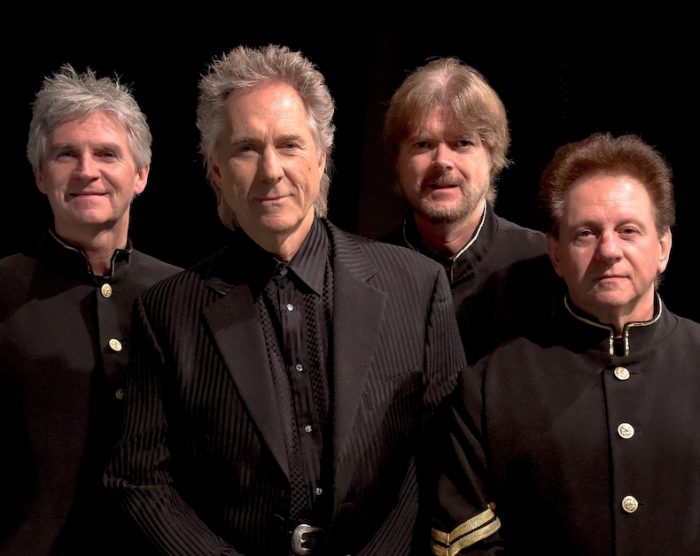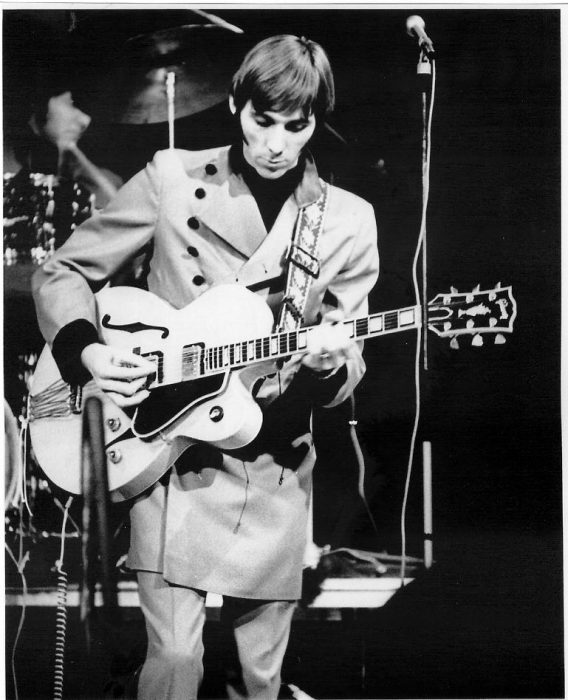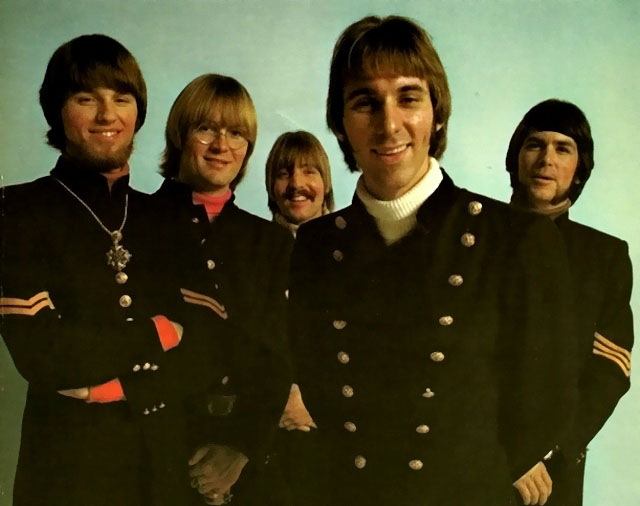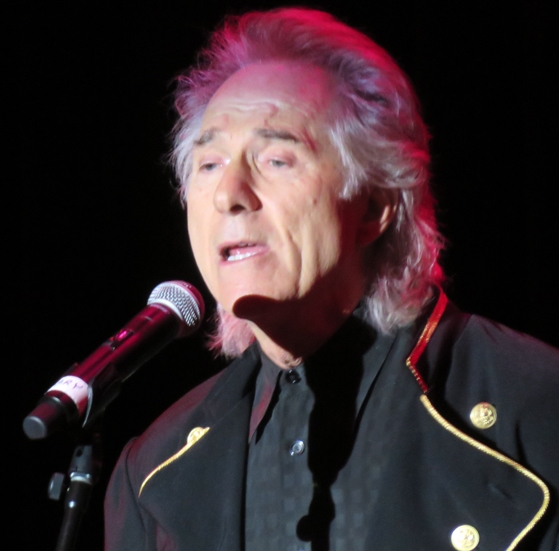
(Photo courtesy Gary Puckett)
By Steve Houk livingonmusic.com
For Gary Puckett, once he found the band he wanted, rock and roll success came at a fast and furious clip.
After only a year of being together, he and the Union Gap — yes, those guys he dressed up in Union Civil War uniforms and posed in mock ghost towns — allegedly sold more records than the Beatles in 1968 and were anywhere and everywhere a radio or turntable was. Million selling hits flowed like wine, dominating the vernacular of a generation of listeners, they were songs dealing with a host of compelling topics like infidelity (“Woman Woman”), inappropriate love (“Young Girl”), unfulfilled sex (“Lady Willpower”) and moving on from a romance with “Over You,” which was the band’s fourth consecutive million seller written by composer Jerry Fuller. And Puckett’s powerful and memorable vocals were what led the charge.
You’d think that kind of major success early on would pave the way for a consistently fruitful career. But that’s not necessarily what happened with Gary Puckett, not back then anyway. After feeling he wanted to sing some different types of songs, and also sensing he needed a break, Puckett walked away from the Gap, a regretful decision that thrust him into an extended period of self-doubt, bankruptcy and becoming born again.
“It was the wrong turn. It was the wrong move. It was the wrong time,” Puckett told me on a break from his current Gary Puckett and the Union Gap tour which stops at the Birchmere on October 6th. “I had decided that I wanted to take a year off. Silly me. I mean, I didn’t know what was coming up. It was a foolish move.”

(Photo courtesy Gary Puckett)
Puckett acknowledges that as he was mulling his next move, all with his Gap’s monstrous success in the close by rear view, he knew that it was a tough time for some Sixties bands to sustain momentum, the decade was coming to an end and a slew of artists were in a position where they had to either adapt to the times or fade away. Some made it, some didn’t.
“It was 1969 and they were trying to wind down the Vietnam War and things were changing, just in the attitude of the public,” the affable Pucket said. “You know, they were looking forward to the 70s. And there were a couple of different kinds of music that were coming up, one was blues rock, and we’d been through the English invasion, and another one was called disco. And only a few artists actually survived that 60s to 70s transition, like Three Dog Night, Stevie Wonder, Elton John. And Dylan? Dylan survived. But there weren’t very many of us. So I walked.”
It took a few years and some struggles and soul searching, but Puckett bounced back, and these days, as he and a new group of Union Gappers roll across the USA sending fans back in time with the oh so familiar strains of those late 60’s radio staples, things are going great guns for this 70 year-old former hitmaker. Nostalgia has caught up with the times, and Boomers are yearning for music to take them back, and Puckett, whose pipes remain pretty darn golden even this far down the road, is as thankful as you can be for the second chance.
“It feels wonderful. Honestly, the night before last we were in Morehead, Minnesota, which is of course right next door to where I grew up, it’s across the river from Fargo, and I was born in Minnesota. So, you know, to go on stage and immediately tell the people I was their neighbor, it was great. And they’re just clamoring after the show, finding me and saying, ‘Man, we just love the songs, they take us back,’ and all that kind of stuff. So I’m always encouraged, and filled with love, and you know, whatever goes along with that good feeling.”

Gary Puckett (front) and the Union Gap circa 1968 (photo courtesy Gary Puckett)
In the early sixties, Puckett dabbled in bands for awhile but wanted to make records and not just get stuck playing small bars, so he put together a band and came up with a shtick that he thought might propel them above the normal ‘rock star’ looking bands.
“I took the guys to a place in Los Angeles called Western Costume, that’s where all the movie people would go to get their World War two outfits, their Indian outfits, their colonial outfits, whatever it was. So I rented one Civil War outfit because we couldn’t afford to buy them, we were all pretty poor. I took the guys to Tijuana and found a tailor, spoke no English and I spoke no Spanish, and he looked at the jacket and nodded his head and wham, he made the first outfits for them, and then we got the hats made. Then I put together a little photo session at Knott’s Berry Farm, that’s a kind of a ghost town sort of attraction. We went there and they have a saloon and a jail and a cemetery. Fun kind of stuff, you know, we jumped over the tombstones, we got thrown in jail by the sheriff. In the saloon, you know, huddled up with the saloon gals, and all that kind of stuff. And I put all these pictures with lyrics with a demo in a portfolio.”
Little did Puckett know that a subsequent drive-by with said portfolio and demo in hand would change his life forever, and start a feverish hit music run that is in some ways unparalleled.
“I took it to all the record companies in Los Angeles, and literally the last place I stopped, we kept the car running. I mean, we’d been on the road on the sidewalks for six days. So I saw some big records on the side of a building and thought, what is this? I said, ‘Don’t get a ticket, go around the block. I’m sure I’ll be back in five minutes.’ It was CBS Records and there was a lady by the phone and I said, “Would you want a new group?” And she said, ‘Go to the second floor, you’ll find a guy by the name of Jerry Fuller.’ And yeah Jerry Fuller was inside. He was pounding a nail on the wall to hang a gold record.”
From there, Fuller would would write and produce the four million sellers for Puckett and his Gap (as well as hits like O.C. Smith‘s ‘Little Green Apples’) that would propel them up the charts and plaster them all over the radio. But despite the rocket-like success, Puckett wasn’t digging the power ballad direction that Fuller was leading them in, and after he and the band refused to record at a session where Fuller had set up a 40-piece orchestra, the producer and band parted ways for good, and Puckett decided he’d try and discover some other creative avenues, but it definitely didn’t reap the rewards he was hoping for.
“I thought, okay, I’m gonna go back and study more dance. And it wasn’t until 1979 that I was really able to start playing music again. So I didn’t really work publicly for a long time. That was years of a sort of bleak, lonely kind of musical existence.”
After that first tough period, Puckett had some hope when he was courted to get back out and play his songs, but it was a short lived comeback.
“It was around the early 80s that I decided to move back to LA, and I started getting phone calls from people saying, ‘Hey, these classic rock stations are proliferating throughout our country, so would you like to go out on the road again?’ I said, ‘Well, let’s talk about it.’ And I ended up going out on the road with the band, but it was kind of the wrong time still, and I ended up in bankruptcy, mainly because I made sure that the opening acts got paid and I made sure my band got paid, but I generally didn’t get paid.”

(Photo courtesy Gary Puckett)
After another dark stretch, a time when Puckett discovered God as a way to deal with the tough times he was experiencing, he hooked up with a well-known music maven, and this time, he would begin a pretty steady and successful run that has largely carried through to right now.
“We had worked at the Meadowlands on one of those great big rock and roll shows that had 10 or 12 bands, and everybody did three songs or whatever it was. A guy came up to me and said, ‘My boss would would love to talk to you’ so the following day, I went in and met a guy by the name of David Fishof who’s still in New York City today. He was working with The Association, The Turtles, and he said, ‘I’d like to represent you.’ And I thought, well, what could it hurt, you know? So I said, okay let’s go, and then I brought in the idea of starting a tour with The Turtles, The Association and me. And he liked the idea. And here we are in 2019, touring with those bands, and also just me and the Gap.”
Gary Puckett has used a combination of resilience and yes, his own later discovered spiritual will power, to beat the odds and make his way back into the mainstream classic rock world, one that so many people revere these days because it returns them to a time when life was simpler and less complicated. Like alot of music does. And Puckett can feel that vibe, and the love, every time he plays.
“I’ve got the greatest band in the world right now. And what I’m able to see in the audience on this tour is amazing. On the last song for me each night, which is ‘Young Girl,’ I tell them to turn off the spotlight on us, and shine it on the audience. I can see that people are standing up and smiling and they’re singing the words, ya know, ‘Get outta my heart!’ And you know what, it’s just the greatest thing to hear.”
Gary Puckett and the Union Gap perform Sunday October 6th at the Birchmere, 3701 Mount Vernon Avenue, Alexandria VA 22305. For tickets click here.
